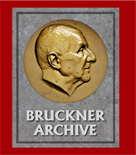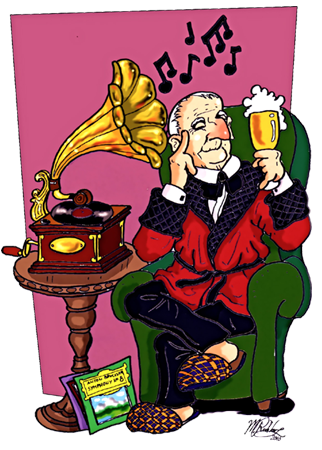Hohlbaum, Robert: Die Herrgotts-Symphonie
The novel's title is Die Herrgotts-Symphonie, by Robert Hohlbaum. (Presumably that translates as "The Lord God's Symphony"). It's one of three Bruckner books he wrote. (I've got one of the others and am working on getting hold of the third.) The story of this one is a little tale featuring Bruckner, Wolf and Brahms - with appearances by Hanslick and three students. Wolf is portrayed as a wild, passionate, disturbed individual, supporter of Bruckner, but given to blasphemy and regarding himself as God's equal who can create something out of nothing. Brahms is seen as a cold North German, somewhat jaded and disillusioned by his own success, and without faith. Bruckner's struggling to complete his Ninth. He has a crisis of faith, but is visited by three students who have been rehearsing the Te Deum. One falls on his knees before Bruckner and says Bruckner has restored his faith. God appears to Bruckner to thank him for dedication his Ninth to Him, and offers to complete it with Bruckner; but Bruckner asks to hear his Sixth that he's never yet heard. He dies listening to his Sixth. Brahms and Wolf attend Bruckner's funeral, both much troubled. Bruckner travels through heaven on clouds of sound, conducting his Te Deum sung by heavenly choirs. The clouds part, he sees the earth below, and asks God to send a sign to those two fellows on earth, who are having things far worse that he ever did, that He has not forgotten them. Brahms senses a old, bitter-sweet, but ceaselessly more beautiful transfiguring sound; the night that surrounds Wolf disappears before an invincible light, with which comes a song, so certain and eternal, such as he'd never heard before. Bruckner smiles, and this smile was also a sound that climbs down to earth and blesses all those whose hearts are pure. Hohlbaum biography from Wikipedia: Robert Hohlbaum (August 28, 1886 February 4, 1955) was an Austrian-German librarian, writer, and playwright. He was the son of an industrialist Alois Hohlbaum in what is now Krnov in the Czech Republic, then part of the Austro-Hungarian Empire and known by its German name, Jägerndorf. Hohlbaum studied at Graz and Vienna and received his doctorate from the University of Vienna in 1910. He gained employment as a scientific librarian, but maintained an avocation as a writer, writing principally for the journal "Muskete". Hohlbaum was a nationalist and became an officer in the Austrian army during World War I. After the war was over he became involved with the Austrian wing of the right-wing German People's Party. In 1933 Hohlbaum moved to Germany, where he became a citizen in 1937. He thrived during the Third Reich, becoming first the director of the municipal library at Duisberg and later, in 1942, that of the state library at Weimar. In disgrace after the war, Hohlbaum was able after a number of attempts to return to Austria in 1951. He settled first in Vienna, and later in Graz, where he died in 1955. His most significant work after the war ended was a Bruckner book, Tedeum. |
|
Scans from the book | |||







